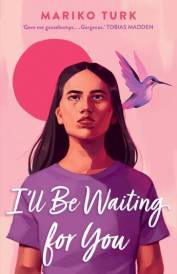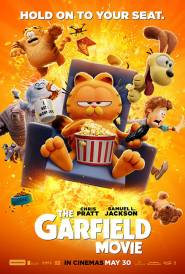Mace Neufield Invictus Interview
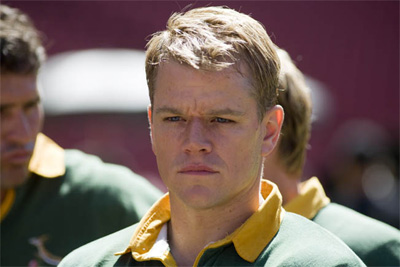
NEUFELD: A HOLLYWOOD SURVIVOR
EXCLUSIVE Mace Neufield, Invictus Interview by Paul FischerMace Neufield has been an established part of the Hollywood community now for some 30 years, having been involved in some of the industry's most prolific successes, from 1976's original horror classic The Omen, to No Way Out, The Hunt for Red October, Patriot Games and Phillip Noyce's The Saint. His latest project is Clint Eastwood's inspiring rugby/Nelson Mandela biopic Invictus starring Morgan Freeman and Matt Damon. In this exclusive interview, Neufield talks about this and offers more insight into the next Jack Ryan project on which he serves as producer.
QUESTION: Now you've been in this industry now for some 30-odd years, so I'm just wondering, when you take on a project now, does it have to be a project that is what I would call "a passion project," such as this movie is, that's obviously one that will be close to a lot of people's hearts?
MACE NEUFELD: Well, my criteria is - I mean, broadly, if I see a piece of material - a book, or a book proposal, or an article or a spec script, if I feel that it's something that I would want to go and see myself -then I get involved. And, as you know, the process sometimes takes, on a film, as long as 14 years, which No Way Out did and even the first Clancy book, Hunt for Red October, I optioned in 1984, and we didn't shoot it until 1989. So you have to have a lot of persistence. And this particular film, Invictus, actually came together, I think, more quickly than any of the films that I've done.
QUESTION: Is that because of Clint? I mean is he a driving force behind getting something done if he wants to?
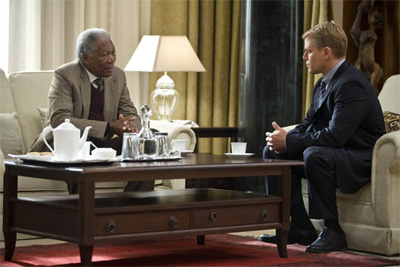 MACE NEUFELD: Absolutely. I'd developed the script with Morgan's company. Tony Peckham, who had written a script for me previously at Paramount, was the first one I called, because I didn't really know anything to speak of about rugby. I knew the Mandela story. And I called Tony, and I said, "Do you know anything about the 1995 rugby World Cup?" And that was like pushing a button, because he's South African. And he said, "Oh, that was one of the great moments in South African history," et cetera, et cetera, et cetera.
MACE NEUFELD: Absolutely. I'd developed the script with Morgan's company. Tony Peckham, who had written a script for me previously at Paramount, was the first one I called, because I didn't really know anything to speak of about rugby. I knew the Mandela story. And I called Tony, and I said, "Do you know anything about the 1995 rugby World Cup?" And that was like pushing a button, because he's South African. And he said, "Oh, that was one of the great moments in South African history," et cetera, et cetera, et cetera.QUESTION: In fact, it's really more a European story than it is an American story. I mean, did you intentionally try to figure out a way to make the film as accessible outside of countries like Britain, Australia, South Africa? Commonwealth countries, that are used to seeing stories about rugby, or know about rugby?
MACE NEUFELD: Well, no, there wasn't much we could do about that. I mean, rugby is rugby. But we felt that - it was a wonderful way to tell the Mandela story, around a sporting event. It could have been football, or basketball. But he anchors the film. And watching it - you know, because Morgan's performance looks so effortless. And it's got a lot of subtlety. I mean, now having seen the film many times, each time I notice something else that - the rugby - you know, we figured it would take too long to explain the rules of rugby to Americans. So, let's just show how tough and violent that game is. But we didn't try and Americanize that at all.
QUESTION: You could have made it a very simplistic - I mean, anybody else could have turned this into a very simplistic tale for American audiences. You avoided doing that, combining the depth of the politics with the sporting metaphor, which I guess is really what this is. Was that always both yours and Morgan's intention, to begin with?
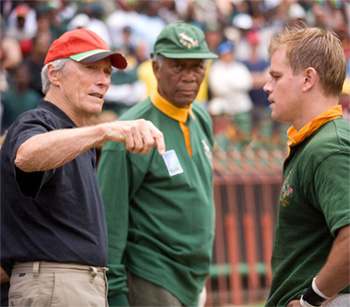 MACE NEUFELD: Absolutely. I mean, what happened was that there you know, after Tony Peckham said that he could - he thought he could really knock this one out of the park-and I thought, "Well, there's only one person who can play Mandela, and that's Morgan." And I knew that Morgan had been trying to do The Long Walk to Freedom, Mandela's autobiography. And I didn't know where he was. But I called Lori McCreary, who's his producing partner. And it turned out that she had seen the same book proposal, and they were discussing. And I said, "Well, why don't we just get together, and you can meet Tony, and see what he's got to say?" So we had a meeting. And after the meeting, we decided we'd partner up. And then he did - he wrote the script. And so we had Morgan, for Mandela, and we had a great script.
MACE NEUFELD: Absolutely. I mean, what happened was that there you know, after Tony Peckham said that he could - he thought he could really knock this one out of the park-and I thought, "Well, there's only one person who can play Mandela, and that's Morgan." And I knew that Morgan had been trying to do The Long Walk to Freedom, Mandela's autobiography. And I didn't know where he was. But I called Lori McCreary, who's his producing partner. And it turned out that she had seen the same book proposal, and they were discussing. And I said, "Well, why don't we just get together, and you can meet Tony, and see what he's got to say?" So we had a meeting. And after the meeting, we decided we'd partner up. And then he did - he wrote the script. And so we had Morgan, for Mandela, and we had a great script. And Morgan said, "You know, the director I trust most in the world is Clint Eastwood." And I said, "Well, you know, I've been trying to get him to read a script of mine for 15 years," which I really had. You know, sending it through his agent or his manager. And Morgan said, "Well, you know, I'll send him a script. He'll read it for me." And - I thought, "Well, that's a real long shot, but okay." And then about six weeks later, Clint called Morgan and said - apologized for having taken so long, because he had gone on vacation after doing the two Iwo Jima films. And he said, "You know, I really like this. Do you mind if I read it again?" And of course Morgan said to him, "Well, sure, Clint. Read it, take your time."
And then the next thing was a call to have dinner with Morgan, Clint, and Lori. And when I arrived at dinner - I thought this was gonna be a discussion about it. And Clint started right off to talk about how he was gonna shoot this film, and when we were gonna shoot it, and where we were gonna shoot it.
QUESTION: Was it difficult to find the right locations to film it?
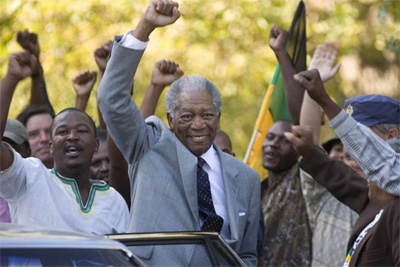 MACE NEUFELD: Well, no. Actually, Morgan and Lori had shot a film in Africa years before. And Morgan had a relationship with Nelson Mandela, and Lori had relationships with the people around him. So, it wasn't difficult. I mean, Robben Island was a difficult one to get. It was - they agreed to let us have it, then they pulled it back three or four times. And eventually they closed it up for two days. And we went out there. And of course, Clint, who's the most judicious filmmaker in the world, finished all our work in one day.
MACE NEUFELD: Well, no. Actually, Morgan and Lori had shot a film in Africa years before. And Morgan had a relationship with Nelson Mandela, and Lori had relationships with the people around him. So, it wasn't difficult. I mean, Robben Island was a difficult one to get. It was - they agreed to let us have it, then they pulled it back three or four times. And eventually they closed it up for two days. And we went out there. And of course, Clint, who's the most judicious filmmaker in the world, finished all our work in one day.QUESTION: Yes. He is the most economical filmmaker, probably, that exists.
MACE NEUFELD: No question.
QUESTION: What surprised you about working with Clint?
MACE NEUFELD: What surprised me? Yeah. Well, what surprised me is that the reputation that precedes him is absolutely earned. You know, we worked civilized hours. Ten o'clock in the morning, crew call. And generally a wrap at around 5:00 in the afternoon. And - since we have a mutual friend, Philip Noyce - you know, I was talking to Philip, who's from South Africa, and he was shooting in New York, Salt, with Angelina Jolie. And he said, "How's it going?" I said, "It's going really well." I said, "We shot"-it was about the third day. And we shot from 10:00 to 4:00. He said, "Oh. I bet that's a really long day." [LAUGHTER] And I said, "No, no. Philip, 10:00 in the morning 'til 4:00 in the afternoon." He said, "It's impossible. How many set-ups did he do?" I said, "I don't know. I'll have to check it out, but I think around 20. Twenty set-ups." He says, "Man. How did he do it?" I said, "He just knows what he wants, and moves on after every take. And everybody's ready, and everybody knows what job they've got to do, and there's no rewriting, and no nervous tension. And it's a civilized way of making films. You and I ought to try it."
QUESTION: What has struck you the most about the way in which the American film industry has changed in the last three decades, and has it changed for the better?
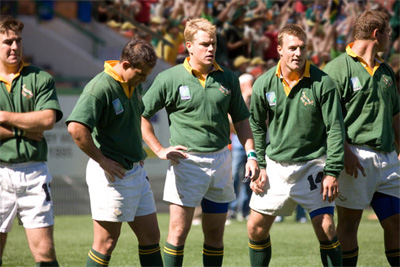 MACE NEUFELD: As far as I'm concerned, it hasn't changed for the better, no. I think - you know, the loss of major film studios - you know, I spent most of my - or, a good portion of my producing career under exclusive contract to Paramount. I never had to worry about raising money for films. And then I went over to Sony for four years. And - I think that - you know, marketing has become so expensive. And-and outside financing has become more and more difficult to get. You know, for the reasons we all know.
MACE NEUFELD: As far as I'm concerned, it hasn't changed for the better, no. I think - you know, the loss of major film studios - you know, I spent most of my - or, a good portion of my producing career under exclusive contract to Paramount. I never had to worry about raising money for films. And then I went over to Sony for four years. And - I think that - you know, marketing has become so expensive. And-and outside financing has become more and more difficult to get. You know, for the reasons we all know.And - so, losing MGM/United Artists as one studio, the changing of ownership of Universal and NBC, another situation, the majors cutting down on the number of releases they're doing every year - it makes it very difficult. And you have to - you know, be very resourceful. Spend more time on trying to find somebody to finance your movie, than worrying about the development of that movie. I mean, we still worry about it. But - you know. When I was - you know, I think the old, old studio system, before I got here, was - really worked like a charm, you know? Because everybody was under contract to a studio. And - they made a lot of movies. And you weren't depending on your next movie to be a hit, to make a living.
There are a lot of people now, unfortunately-- the flight from Hollywood has been dreadful, to - with the - they've put in a modest tax-rebate bill here. So, people fly off to New York, and to New Orleans. To Canada. And - you have this great film community here, who's really been affected by this.
QUESTION: Why do you remain so passionate, or so committed to continue making films?
MACE NEUFELD: Well, it's what I do. [LAUGHTER] I love to make films. I don't like to go out and - I love to develop scripts. And I love to make the movies. I'm not thrilled about having to run around and try to get the movie for them. It's tougher now than it ever has been. But - you know, I'm - I don't know what I would do if I - well, I do. I might pick up my camera again, and start to be a photographer, which I started out to be - you know right out of high school. Or, I would play piano in a - in a cocktail bar. Two things that I could fall back on. So.
QUESTION: I could imagine there's lots of money in piano-playing cocktail bar.
MACE NEUFELD: Well, you know. Tips. You put the brandy snifter up there, and say - "Mace entertaining nightly." I have a little sign that says that.
QUESTION: What projects are you developing that you think are likely to go?
MACE NEUFELD: Well, hopefully - you know, my major project is the next Jack Ryan movie.
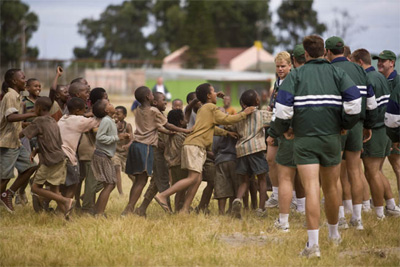 QUESTION: Let me ask you about that franchise. The last attempt at rebooting the franchise met with a lot of critical derision. I actually really liked Sum of All Fears, actually, a lot, myself. But I know that it got a very mixed response. A lot of critics really did not like Ben's portrayal of the character, or his performance. And I'm just wondering, what are the pitfalls to rejuvenate that franchise, and do so with an original script? Which is what I understand you guys are thinking of doing.
QUESTION: Let me ask you about that franchise. The last attempt at rebooting the franchise met with a lot of critical derision. I actually really liked Sum of All Fears, actually, a lot, myself. But I know that it got a very mixed response. A lot of critics really did not like Ben's portrayal of the character, or his performance. And I'm just wondering, what are the pitfalls to rejuvenate that franchise, and do so with an original script? Which is what I understand you guys are thinking of doing.MACE NEUFELD: Well, yes. We've run out of books. And - actually, the last film - you know, did very well. We did - I think 120, $123 million domestically. They made a lot of money. And on the previous three. And - you know, they want to reboot that franchise. Because it will - you know, it'll invigorate The Hunt for Red October, Clear and Present Danger, Patriot Games, Sum of All Fears, so they can come out and repackage those together. So Jack Ryan's a great character.
QUESTION: Now have you had any discussions at all with Clancy himself about story ideas?
MACE NEUFELD: No, I haven't.
QUESTION: Do you know how he feels about this idea?
MACE NEUFELD: No, I have no idea. My discussions have been with Paramount.
QUESTION: And at what point within the cycle would you hope to - in terms of the timeline - would the franchise be rebooted from preceding Sum of All Fears? Would you use that as a point of renewal? Or would you establish the character already as an analyst?
MACE NEUFELD: No. We've established him on Wall Street. And then he becomes CIA.
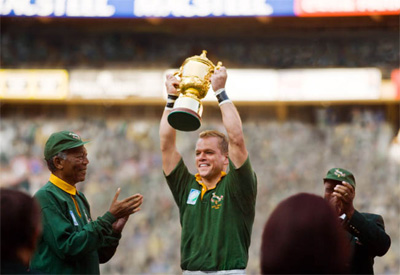 QUESTION: What about directors?
QUESTION: What about directors?MACE NEUFELD: We have not set a director yet.
QUESTION: How is the hunt for a director coming?
MACE NEUFELD: Well, we're not hunting at the moment, yet. We're getting a screenplay after the first of the year.
QUESTION: Have you spoken to Phil at all about him coming back? Or has he basically said he doesn't want to do that?
MACE NEUFELD: Well, we talked about it. Right now, he's busy with finishing up Salt.
QUESTION: Obviously these movies have varied in cost over the years. Given the financial crisis, are movies more expensive? Or are you and the studio really trying to make an effort to keep costs down?
MACE NEUFELD: We always try and make an effort to keep costs down, yeah. The most expensive was the last one. But - certainly they were not -exorbitantly expensive. And we don't expect this one to be, either.
QUESTION: What are going to be the difficulties for you in casting Jack Ryan?
MACE NEUFELD: Yeah. Well, it's been published. We're in negotiations with Chris Pine.
QUESTION: I never know if these things are true.
MACE NEUFELD: No, that's true. Yeah.
QUESTION: Now are you prepared to embark on the political Oscar campaign that Invictus is obviously going to be a part of? And nothing else coming up?
MACE NEUFELD: Always. That's a part of my job. And as far as my next one - you know, I'd love to go Ryan. But I have other things in development. But you never know.
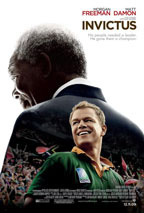
Invictus
Starring: Morgan Freeman, Matt Damon, Clint EastwoodDirector: Clint Eastwood
Genre: Dramas
The film tells the inspiring true story of how Nelson Mandela joined forces with the captain of South Africa's rugby team, Francois Pienaar, to help unite their country. Newly elected President Mandela knows his nation remains racially and economically divided in the wake of apartheid. Believing he can bring his people together through the universal language of sport, Mandela rallies South Africa's underdog rugby team as they make an unlikely run to the 1995 World Cup Championship match.
MORE
Copyright © 2001 - Girl.com.au, a Trillion.com Company - All rights reserved. 6-8 East Concourse, Beaumaris, Vic 3193, Australia.


